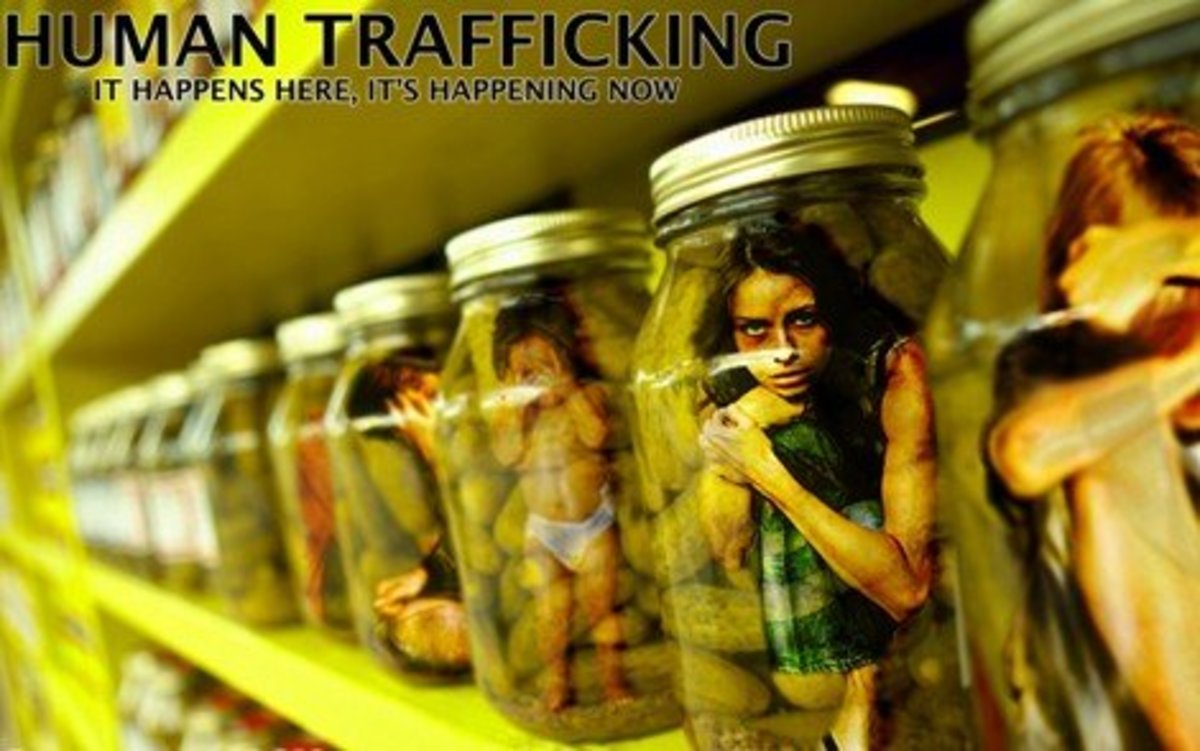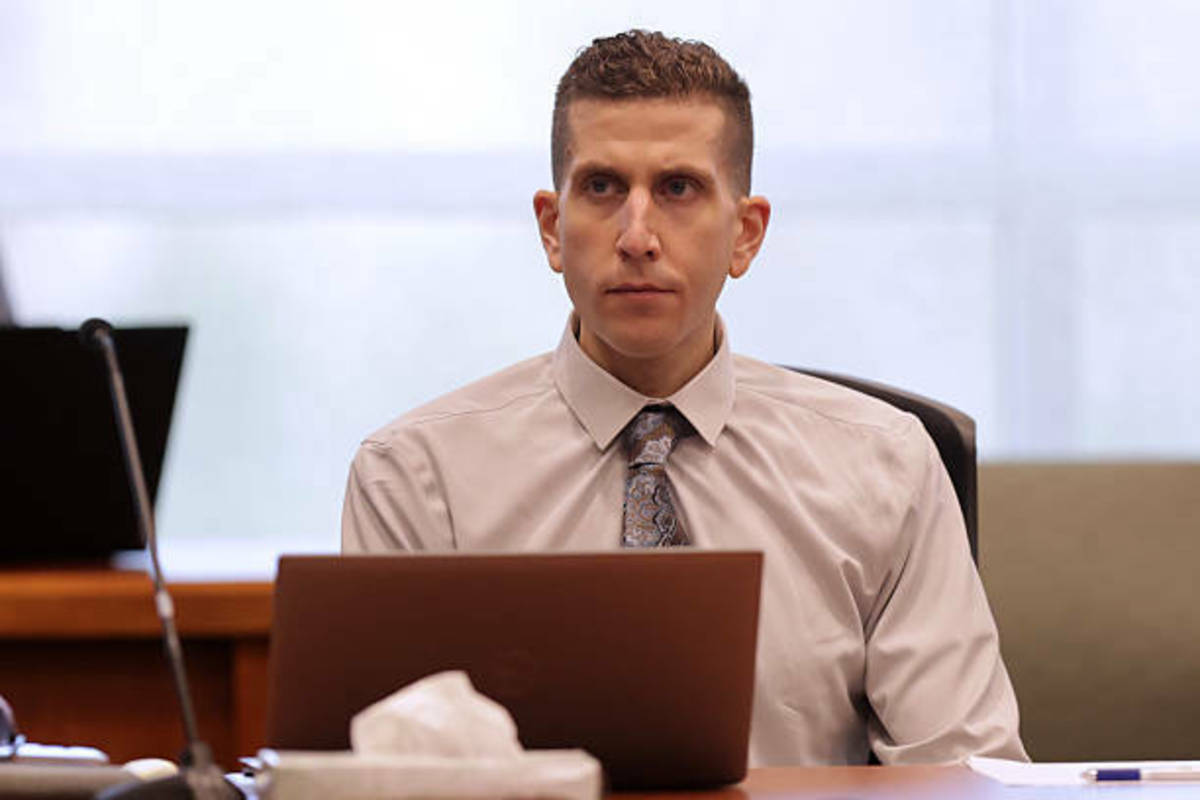Interviews with four convicted sexual predators --Part II

Wise words from a professional in the field
“My problem with the circus surrounding sex offenders:
We are persecuting a small number of people who are representative of larger problems in our culture. We hang their pictures on the wall to throw darts at; meanwhile, relatives are abusing children in probably 1 in 3 households in the U.S. We focus on the identified ones to the degree that families of those who are unidentified keep quiet so as not to put their loved ones and themselves into the public eye in such a disgraceful way.
So the girl whose uncle abused her will continue to keep quiet about it because of the circus she sees surrounding the offenders who are identified.
Our culture has sexualized and fetishized youth and glorifies power: a dangerous combination.
We should be trying to rehabilitate the culture and the offenders rather than finding more ways to ostracize them from the culture that produced them.
Children weren’t safe before the internet.”
-- A quote from a professional child protection worker sent to me second hand in response to Part I of this series. Although I don’t have a name to credit with these words, they certainly speak common sense.

Just between us ...
I never would have believed where this simple idea: interview a few of those convicted of heinous sex offences and see the crimes from a new perspective, that of the offender, as opposed to my long-held views based on years of work caring for the victims -- where it would take me, nor the diverse and sometimes heated responses the first part of this article received.
Some troubling new ideas surfaced while doing the background research. The focus of my statistical information was Florida, but my anecdotal material came from across the nation. I began to believe there were many people suffering life-destroying effects of registration undeservedly.
I also felt the law, in some respects, was not reflecting the truth of society's practices, and as we all know, morality cannot be legislated. Before anyone jumps on me for saying this, let me add I am not speaking of child molesters, of child sex abuse, of rapists, of incest-abuse, of violence, coercion, none of these monstrous acts, but of those whose crimes were in fact, victim-free in a way. The person who believes his alluring young partner to be 18 or 19, only to find out later, she/he was 15 or 16; the young adult of 20 or 21, young for their years, in a relationship with a partner of 15 or 16 mature for hers/his; those situations we all know to be common, but the law states as a crime -- a felony.
Do I condone underage sex? Does it matter if I, or anyone of you do or do not? -- it will go on as it always has, and there will be those who will suffer for being beyond a certain age limit. (And no, for those prone to jumping on such statements and going to extremes -- am I saying it's okay for a man of 40 to bed a girl of 14 -- of course not -- and you are well aware I am not!!) Certainly the law must set a limit, and must punish transgressors, but must it subject such cases to the destructive effects of the sex offenders' registry?
Should there not be 'different spanks for different ranks' of offenses? (something between nothing and 25 years on the registry, with all the life-damning effects of registration.)
But all these reactions from the previous article must now be put aside.
Except, because of them, and also due to what I found on interview, I've made a change. Unfortunately, the title had already been set in stone, but if I were able to start again, I would call it:
Interview with two convicted sexual predators, and two registered sex offenders
Categories of Sex Offenders
Level 1 Offenders, considered the least dangerous,
determined to have a low likelihood of re-offending, with many first time
offenders, make up the majority of the sex offenders in our society. The
victims of these offenders are frequently family members or others living in
the home of the offender. His or her crimes are not considered violent or
predatory. In Florida, registered for 25 years.
Level 2 offenders have a
moderate likelihood of re-offending and are considered somewhat of a threat to
the community, may have more than one victim, or abuse occurring over a length
of time, may groom their victims or use threats of violence to commit their
crimes. These crimes may be considered predatory with the offender using a
position of trust to gain control over the victim and have little to no empathy
with the victims. In Florida, registered for 25 years.
Level 3 Offenders (Predators) are highly likely to re-offend. The offenses are likely to be predatory in nature and pose a potentially serious threat to our communities. Offenders in this category are likely to have multiple offenses and their crimes may involve violence, coercion and the use of weapons. In Florida, registered for life.
The Adam Walsh Act has removed the right for registered offenders to petition the court for removal from the list.
(For those readers who want names, file numbers, etc – not here. Sorry, but I’m not using anyone’s name.)
For three consecutive Wednesday’s I drove to the Sarasota County Offices, and there met with those law enforcement officers who kindly assisted me with this project, one a Deputy Sheriff, who we’ll call Deputy Dan (DD) and the other an officer with Florida Department of Corrections, who specializes in the supervision Predator designated offenders Level 3). We’ll call him Officer Lorne (OL).
On this particular Wednesday, we sat around for an hour, drinking coffee, while I asked questions, using my trusty recorder to ensure all answers are recorded here verbatim.
What is the real purpose of the sex offender registry – a tool for law enforcement, a control mechanism, punishment or a public service?
DD: The registry is first a way to make people aware of sex offenders in their area, so they can take steps to ensure theirs and their children’s safety.
OL: Within limitations -- most people are shocked at the number of registrants in their area. But looking at the registry doesn’t give someone context to tell if the offenders is really a danger or not. Not all sex offenders are alike, or pose a danger.
Does it work in reducing sex offenses?
DD: It is also a tool. When a child is missing, we know the names and location of those persons with a history of that kind of crime – for example.
Me: But according to statistics, over 95% of newly reported sex crimes are committed by someone without a record, and not registered. Isn’t this kind of like, “round up the usual suspects?”
DD: (laughs) Maybe, but numbers of reported sex crimes have dropped in recent years. Seems to me ... I think... Something’s at work here.
Me: I have the statistics for the past fifteen years here, and according to these reports, the decline started before Megan’s law came into effect. They dropped drastically when the Adam Walsh act was first applied – but --
OL: You’re about to quote a study suggesting fewer crimes are being reported because of the fear of the offender’s being subjected to the new and harsher regulations.
Me: Well, yes I was. As most sex offences are intra-familial, it stands to reason. My experience with victims suggests family love does not disappear through abuse. And often the victim is pressured by family members to remain silent, because the offender is the main financial support of the family, or for fear the family will be broken up.
OL: I believe this is certainly a factor – a strong factor and an unfortunate one.
What are the recidivism rates for sex offenders?
I found this report released a few years ago by the Department of Justice. It is a study based on convicted sex offenders who were released from prison in 1994.
Here are some of the findings from the study:
- Within 10 years following their 1994 state prison release, 5.3 percent of sex offenders (men who had committed rape or sexual assault) were rearrested for another sex crime, the Justice Department's Bureau of Justice Statistics (BJS) announced today. If all crimes are included, 43 percent of sex offenders were rearrested for various offenses.
- Sex offenders were less likely than non-sex offenders to be rearrested for any offense –– 43 percent of sex offenders versus 68 percent of non-sex offenders. But sex offenders were about four times more likely than non-sex offenders to be arrested for another sex crime after their discharge from prison –– 5.3 percent of sex offenders versus 1.3 percent of non-sex offenders
Which proves what? The public perception that the majority of sex offenders are likely to re-offend seems to be false. 5.3% is an extremely low rate of recidivism -- lowest among all categories of offenders.
Does it stop offenders from re-offending?
DD: I think so. I think fear of the consequences might have a lot to do with it. I read somewhere that 50% of sex-offenders will re-offend.
OL: Sorry, D---- Not so. The rate of re-offense is quite low – I don’t have the figures here, but very low compared to other crimes. (laughs) I suppose you do.
Me: I do. A study of sex-offenders released in 1994 (so they wouldn’t be subject to registration as that started in 1997) shows just over 5% commit another sex-crime.
OL: So there it is. But – and this is a big but – there are those categorized as predators who we are sure pose the danger of repeating their crime. There’s your 5 percent. For those, supervision is necessary – you’re going to meet one this afternoon.
DD: Lucky you.
Me: Can’t wait.
Is it appropriate for level one, first time offenders considered not-a-danger?
Me: In my background research, I learned that many persons on the list for first time offenses are suffering a form of punishment which far outweighs the impact of the crime – and I don’t mean all, so don’t jump on me – but some.
DD: You can’t believe what these guys tell you. They all make light of their crimes; they all want you to believe they’re victims.
OL: He has a point, to be sure, but I do agree with you. There are not just some, but many who pose no danger to the community -- whose crimes had little negative impact on the victim -- whose lives have been adversely affected and ... I rarely see this category … Not my worry.
DD: Yeah – I give you that. There are some on the list I feel sorry for. Just regular Joes who got caught in a bad situation – an underage girl they met in a bar, for example. We do a compliance check on them, and end up losing them their job – it can be tough. But most of them belong where they are, and don’t you forget that – be careful who you believe.
Is it functional? What is the cost?
Me: I have in my hand a study by the New Jersey Department of Corrections and Rutgers University which examined the impact of Megan’s Law in that state. They found registries and notification did not reduce the number of new offenses or new victims, and concludes – here I’ll read it to you. “given the lack of demonstrated effect of Megan's law on sexual offenses, the growing costs may not be justifiable." They estimated the statewide cost in New Jersey to be at least $5.1 million a year. What is your take on that?
DD: I can’t argue with your study, and I agree that almost all sex-crimes we deal with are new offenders, so maybe it’s right. But I can tell you the cost is a problem. It’s our department charged with registering, verifying and publishing where sex offenders live -- we have to pay for extra deputies, cars for them to drive, compliance visits, keeping up the website – and the entire cost falls on this office… At the same time, everyone wants to cut budgets.
OL: Those under Department of Corrections supervision are the worst of the lot. Those numbers are less than one tenth the overall population of offenders. We work in conjunction with the Sheriff’s Department, and I can state they are severely overburdened in this task.
Me: Would it make more sense, then, not to register those that do not pose a danger and concentrate on those that do?
DD: No.
OL: Yes.
Me: Thank you both for your time and for allowing me to talk with you.
Then, Deputy Dan agreed to my change of plans, and would arrange for me to talk to a couple of Level I registered offenders, including a Tampa case I wanted to cover who had got in touch with me via email following Part I of this article. Or, as he said, “I’ll fly it by the Sheriff up there and ask – shouldn’t be a problem.”
Officer Lorne and I departed for our rendezvous with two sexual predators. We took his car and talked more on the way – but if I cover all that, this would become a book.
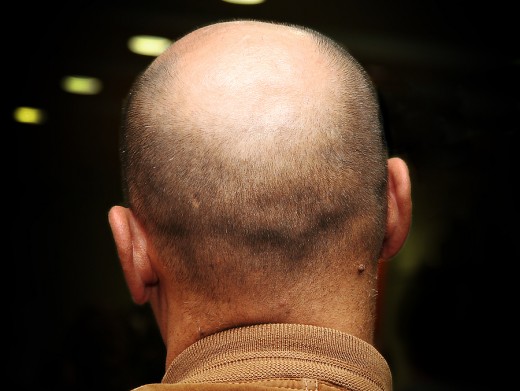
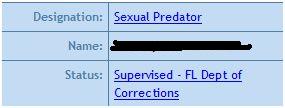
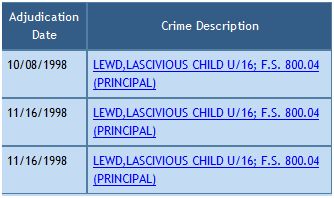
Interview number one – male, Caucasian, 48 – we’ll call him “Sorry”
Sorry lives in an older house in one of Sarasota’s more venerable (read old) neighborhoods – and yes, more than 1,000 feet from any schools, playgrounds, day cares (but considering Sorry is ambulatory and a thousand feet is not much of a walk, I wonder at the efficacy of such a rule.)
He is well-groomed, keeps a neat house and greets both Officer Lorne and I with a handshake and an offer to “come in and take a load off.” We sat around his kitchen table – a clean and nicely appointed kitchen.
We all received a glass of ice tea, and I made a few comments about his garden – very lovely -- uncomfortable and unsure of how to start. I needn’t have worried. Sorry sat down, pulled my recorder in front of him and began to talk, not waiting for questions. This is the transcription, word for word.
Sorry: You’ve seen my file? (He didn’t wait for an answer.) I’m not going to tell you I’m innocent -- I did it -- it was wrong -- and I needed to be punished . (He cleared his throat and glanced at me.) I raped my daughter. This was the beginning, and my abuse went on for a time. I stopped it. When it was time to tell the truth, I did. I was glad too. I was tired of having us both lie about it. I saw what I was doing -- the mistakes we make! Don’t ask me why I did it; I can’t tell you.
I cried for months after I realized what I had done to her
-- my family -- our lives. I am sorry, so sorry. I had only myself to blame. I
did it. I accept the full blame, and do the best I can to live with the guilt. It’s
hard – I know what I did and all I can say is I’m sorry. Doesn’t seem enough.
But I am. (After this statement -- he pushed the recorder to me.)
Are all sex offenders with crimes against children pedophiles? No -- here is the difference.
The legal, law enforcement and public arena all define it differently. There is a medical definition which defines pedophilia as a mental disorder characterized by symptoms of recurrent, intense sexual fantasies about children. Thus, legally, a pedophile is somebody who has these fantasies or sexual orientation. Acting on those fantasies and sexual orientation will bring the pedophile into the criminal arena.
A sex offender is somebody who commits a sexual offence against anybody. This could include those who assault children as well but who are not pedophiles i.e. they do not have recurrent sexual fantasies about children or are sexually orientated towards children. These offenders may simply have perpetrated the assaults against the children because the children are there and are extra vulnerable, or target adolescents who hold traits of both child and adult but are not threatening. Most non-pedophile offenders offend against family members. Incest is a separate pathology, more related to issues of control and domination than sexual desire for children.
The difference is, perhaps, the level of pathology attached to the activity. A pedophile notoriously rationalizes their behavior believing that the children are willing participants in the activity or that it is appropriate for children to be initiated into sexual activity. Pedophiles also have a very, very high recidivism rate because they daily grapple with intense urges to have sexual contact with children and are generally unresponsive to treatment which aims to alter their warped views about the appropriateness of this conduct.
Me: How old was your daughter when you first raped her?
Sorry: Fifteen.
OL: She was thirteen.
Sorry: Yeah – thirteen. I get confused, sorry. That’s right, thirteen.
Me: The one question everyone asks, is how could you do that to a child, your own child.What were you thinking when you did this act?
Sorry: I don’t know – can’t recall. I was mad at her; she was hard to control, you know. Like she wanted to go out at night – I caught her climbing out the bedroom window late at night, and I got mad. We had a fight – like physical – me wrestling her down, like. Then it just happened.
OL: It didn’t just happen.
Sorry: Okay, I did it. My own kid – yeah. (He stared out the window.) Still hard to admit -- you know what I’m saying?
Me: Not really. (A quiet pause of about two minutes.) You said the abuse continued for quite a while – how long?
Sorry: A few months, I think.
OL: Two years.
Sorry: Yeah – she was fifteen when I got arrested, yeah. That’s why fifteen stuck in my mind. I’m not trying to snow you – honest. Just the details get confused in my mind after all these years. I own my crime – I own it. Every day I look in the mirror and see the face of a man who – did that – to his own daughter… Hard to take, to live with myself. You know what I’m saying?
Me: I understand you are saying you have regrets – you’re sorry. Is your daughter still in your life?
Sorry: Yeah – happy to say. It took a lot of work, but we both had counseling and finally we met again. I see her regularly now. She knows I’m sorry. I am so grateful she forgives me.
Me: Most child victims of incest do, in my experience.
Sorry: Yeah. Hard to believe – you know what I’m saying?
Me: Yes, I find it amazing. It seems the connection of children for their parents can overcome just about anything – again in my experience. I’m not here to take details of your crime – not really. Can we talk of something else?
Sorry: Sure.
OL: Before we move on, I think Mr. XX should be a little more forthcoming about his crime, and how he came to be arrested. You noted there are three offenses on his file. In all fairness, before you move on to his sentence and registration issues, you should know the extent of his –
Sorry: Yeah, okay. When my daughter turned fifteen, she ran away from home. She showed up in Miami – the cops – they found her on the street -- if you know what I’m saying.
Me: You’re saying your daughter was prostituting herself. (I wanted to cry for the poor girl – and realized no matter how much Sorry said sorry, he had no idea of what he’d done to his daughter. But it wasn’t my place to educate him. I kept my poker face)
- Publication from Center for Sex Offender Management
This is a link to a chart outlining the various specific laws and their pros and cons -- surprisingly balanced. - The Center for Sex Offender Management
Center for Sex Offender Management- CSOM The Center for Sex Offender Management (CSOM) is a national project that supports state and local jurisdictions in the effective management of sex ...
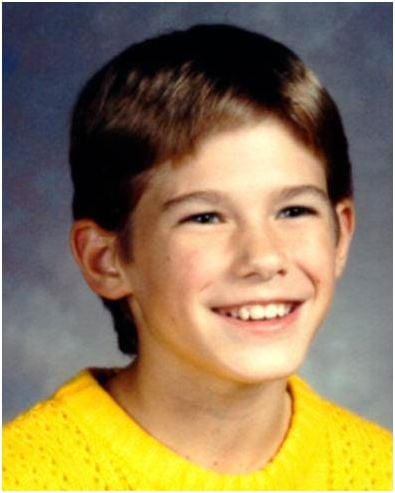
Sorry: Yeah. My wife went down there to get her, and that’s when she told… So my wife called the cops. I was arrested. My wife kicked me out. I lost my family, drove my kid to the street … Yeah -- I think about that every day.
OL: The second charge?
Sorry: I was getting to that. My wife got my younger daughter to say I raped her, too. I didn’t – no -- rape her that is.
Me: Are you saying you had sexual contact other than penetration with your younger daughter?
Sorry: That’s a polite way of putting it.
Me: Are you saying yes?
Sorry: I touched her a little – maybe – but I didn’t hurt her.
Me: You -- How old was she?
Sorry: Three years younger. I
wouldn’t – I’m a bastard, but I would never … I didn't rape her.
Me: Is she in your life now?
Sorry: No. She went up north with my wife. My older daughter moved back a couple of years ago, with her husband and kids. (He glances at OL) The kids don’t come here, though.
Me: What was your sentence?
Sorry: Six years incarceration, ten years supervision and lifetime registration.
Me: Are you employed?
Sorry: Yeah – like there’s a job out there for me. Of course not.
I no longer wanted to ask this man how registration affected his life, whether or not he considers himself a danger to the community, his difficulties in finding employment, how he managed to live. I wanted to leave, and to leave immediately. I thanked him for his time and ‘candor.’
Once in the car, OL handed me a report from his file case. According
to a physical examination, Sorry’s younger daughter at twelve showed clear signs of early sexual
activity. The victim’s statement declared she had been eleven when the sexual
abuse had started, and it had begun with an act of penetration.
“There was also a question of two other victims, his wife’s ten year old niece and the younger victim said he’d ‘touched’ one of her friends, but the DA chose to proceed on the strongest case only,” OL said, as we pulled away from the curb. “We don’t apply the term predator to just any offender. Don’t let anyone tell you otherwise.”
It seems Sorry wasn’t sorry enough.
And as if I wasn’t nauseated enough, OL turned to me with a smile. “You’re gonna love the next one.”
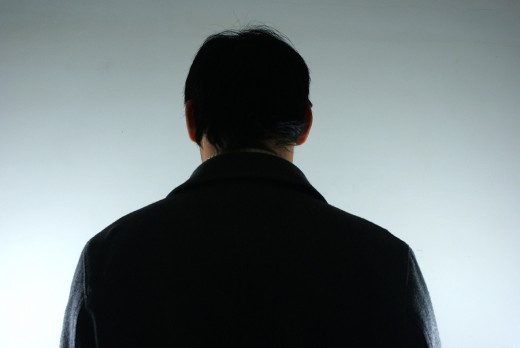
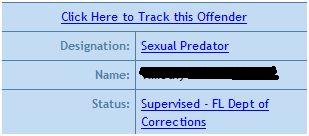

Interview number two -- male Caucasion, age 43 -- we'll call him "Poor Me" (PM)
Our next interview, another sexual predator with a history of crimes against children, lived in a transient apartment complex – all on one level, looking rather like a cheap motel. In fact, the Flamingo’s Nest Apartments had, in earlier times been the Flamingo’s Nest Motel, and our subject had lived there for eight straight years.
It was a depressing place of one bedroom or studio suites, with too small windows, jalousie type facing a barren, black-topped central square which doubled as a parking lot. It looked like a dead zone in the middle of this green, overgrown, fertile state.
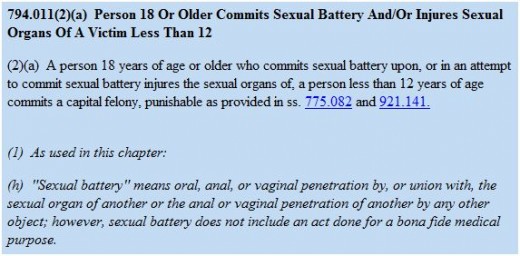
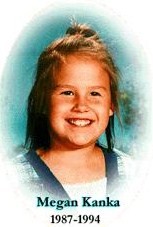
Surprisingly, a large number of children’s toys littered the central space, and the wails of babies and toddlers filled the air.
I raised an eyebrow at OL.
He shrugged. “Can’t do anything about it. Times are tough. Some of these rooms house complete families.” He banged on the door of our destination, and winked at me. “Hang in there.”
OL left me sitting alone with Poor Me, who was about to earn his nickname, while the parole officer flipped through a stack of magazines, and checked the cupboards.
Poor Me watched him with clear antagonism. “He doesn’t believe me. But I never did anything wrong. You won’t believe in my innocence. No one does.” There is a grating whininess to his voice I find irritating. He is a man of medium height, slightly built and with the softness of someone who has avoided exercise for most of his life, and the pallor of one who rarely sees the sun. Excuse me for injecting my own observations – but hey, I’m a fiction writer, not a journalist – but if you’d called Central Casting and asked for someone really creepy to play a pedophile, you’d get this man. Seriously.
Me: Tell me about your innocence – what happened; how did you get arrested?”
PM: I left my girlfriend of the time and she was mad at me for it. A year later, her 12 year old sister says we had sex -- consensual sex -- and I was arrested.
OL: Her daughter, XX. If you’re spinning another story, at least get the provable facts straight.
PM: She told me it was her sister. (He rolls his eyes and smirks at me, as though we have a bond, and I am complicate in detesting the Corrections Officer, or we're sharing a joke.) I couldn’t afford a lawyer so they gave me some useless public defender. I told him I hadn’t done it. This public defender says to me, “Look at her picture. She’s a looker, with big breasts -- like the jury will believe her. You should take a plea.”
I says to him, “But I’m innocent. How can the put me away by saying this happened?” He says, “It’s election time; they don’t need proof. If the jury don’t get you – the judge will – so take a plea.”
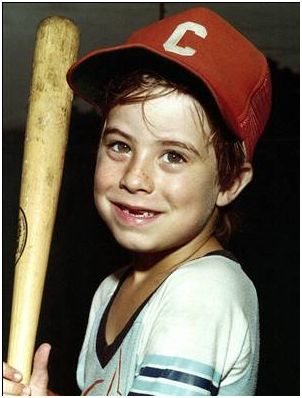
- Information explaining the Adam Walsh Act.
A full description of the Adam Walsh act, whose first title SORNA, is currently enacted in 33 states.
Me: Really? Wow – tough break. So what happened?
PM: I plead no contest and they label me a predator at the time. I had no clue what they meant by that.
Me: Your lawyer didn’t explain?
PM: These public defenders, they work for the state – didn’t you know that? They f***ing work with the DA to put you away.
OL: Watch your language – this is a lady.
PM: Sorry, ma’am. It’s true – they do; the state pays them. Anyway, when you’re charged as a sex offender, no one’s going to help you. I had to watch my family go through all that shit – the embarrassment, the shame; the neighbors hate them now. And then I got a beat down in lock-up and they wouldn’t let me out unless I said I was guilty of this crime. They said ‘If you keep saying you’re innocent you will be charged with ‘discrediting the victim,’ so I couldn’t tell the truth. And while all this is going on, I’m already called a predator … and they already vandalized my house and I can’t live with my mother anymore cause there’s a daycare round the corner, and I paid over $10,000 in fines…All the shame, humiliation, all my rights, respect and dignity stolen, my freedom taken away – now I know what being called a predator means. Yeah – you could say I learned the hard way – You want a coke or something?
Me: No thanks. I’m good. (While this man was speaking, OL was slowly going through cupboards, drawers, closet, even lifting the cushions of the couch, and reaching underneath.)
PM: So now, my family curses me. I do my whole bit in jail; didn’t get early release; they didn’t release me till they had to, cause I refused their stupid treatment program – I don’t need treatment – I didn’t do anything.
OL gives a short laugh.
PM: (He leaned over, and spoke quietly to me.) I told you; he doesn’t believe me.
Me: I wonder why.
PM: You don’t believe me, either. No one ever does. Doesn’t matter. All you need to know is how hard this is; this life. What they done to me – cursed me. It’s the first thing I think of in the morning, and the last thing on my mind at night. If I forget, they’re quick to remind me – the TV, the news, radio, newspaper, internet – though I can’t go there. I get the looks from neighbors, got no job, no friends. I can’t even go down to the harbor and do a little fishing without an okay from the man here – there’s a playground close by. Can’t go see my Mom – there’s a day care nearby, and that’s my house.
I wear this. (He pulled up his baggy khaki pants leg and showed me an electronic monitoring ankle bracelet.) Like some f***king dog – sorry, ma’am.
I tried to get a lawyer to fix this, paid him $2,500 cash and all he said was “They won’t let it back in court.” He kept my money, though. This curse they put on me – it goes on, and it could happen to anyone. All it takes is a few words from the mouth of a mixed up kid to destroy your life.
Think on that.
Me: I will. Tell me, why would this girl make such allegations against you?
PM: I told you, her mother was mad at me for breaking up with
her. She made the kid say these things. I used to think about revenge on her (He glances at OL who has finished looking for whatever it was) but she's just a kid who told a lie, not her fault. And I would never hurt a child.
Anyway, I got one more thing to say and I'm done.
I paid for my crime already and now I want to live what I have left without the label that I gained by mistake. This is affecting everything in my life -- where I live – in this dump; how people look at me; employment -- I have not even had an interview. My mother has to help me out – and I don’t want to be a burden on her. My constitutional rights are being violated and there is nothing I can do to be released from this label – which I don’t deserve. I did my time – you got that? And now I’m being punished all over again.
Me: Is that it?
PM: Yeah. Are you going to write that?
Me: Every word.
PM: He (He jerked his thumb at OL) says you spent years working with the victims – the kids.
Me: That’s right.
PM: So you know sometimes kids can lie, or make a mistake.
Me: I’ve never seen a case where a child made up allegations of rape or other abuse. I’m not saying it has never happened, only that I’ve never seen such an instance.
PM: So you don’t believe me.
Me: Does it matter?
PM: Not a bit. No one believes me. Hey, what’s the worst case you ever saw? Tell me.
Me: No.
Officer Lorne was right; I just loved this one.
I don’t know if you noticed the crime with which he was charged, but the information according to the records states he raped a ten-year-old girl with such force he injured her genitals, injuries requiring hospitalization and medical treatment.
Her mother was not his girlfriend, she lived next door to a previous address.
Also, PM’s mother doesn’t live in Florida.
And he has no other family.
Coming up in Part 3 -- Interview with Two Level I offenders
In order to maintain balance, and to ensure everyone understands the two men interviewed in this article are of the highest risk category of offenders and are not typical of the majority of offenders on the registry, I will interview two registered Level 1 offenders.
Today we saw why the registry for sex offenders, particularly of the highest risk offenders may be a useful tool for law enforcement and society -- though both of these men were not registered at the time they carried out their crimes. Next, we will meet two low-level offenders who believe the continuing punishment of the registry far outweighs any 'crime' they may have committed. I hope you will come back to read their stories as well.
But what, I ask myself have I gained from the two interviews described here.
After all those years of working with the victims, I wanted to find answers to certain questions that had long plagued me. What goes through the mind of an adult during the course of such a crime; how do they see their victims? What is lacking in them that they can so mistreat the smallest and weakest among us?
I thought perhaps by speaking with offenders who had committed these atrocities, I might learn these answers. I didn't.
I did learn there are some among us without a soul, without a heart, without a conscience.
It is often said, eighty percent of abusers were abused, and that may be true. But it doesn't hold true that eighty percent of the abused become abusers. What a conundrun, an enigma, a riddle....
- Interviews with four convicted sexual predators -- Part One
A link to Part One of this series of articles, my background research.


